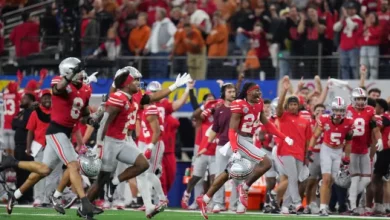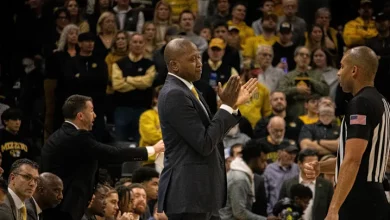Danny Kanell argues that Notre Dame has “hacked” the College Football Playoff system, gaining an unfair competitive advantage.

The College Football Playoff (CFP) system, introduced in 2014, was designed to be a more equitable and transparent way of determining the four teams that would compete for a national championship in college football. It replaced the controversial BCS (Bowl Championship Series) system, which had faced criticism for its lack of transparency and perceived bias toward certain conferences and teams. The CFP, with its four-team bracket, was meant to provide a more fair and conclusive way of deciding the best teams in the country, while offering opportunities for teams from across the nation to showcase their talents on a grand stage.
However, as the years have gone on and the playoff system has evolved, there have been increasing criticisms of the selection process and the way certain teams seem to be consistently favored over others. One of the loudest voices to challenge the integrity of the CFP has been former college football player and current analyst Danny Kanell. Kanell, known for his candid takes on the college football world, has been vocal about what he perceives as an unfair advantage held by certain teams—specifically, Notre Dame.
The “Hacked” Argument
In a recent discussion about the College Football Playoff, Danny Kanell boldly claimed that Notre Dame has “hacked” the system. For Kanell, the argument revolves around the way Notre Dame has navigated the unique circumstances of its independent status and the preferential treatment it appears to receive from the CFP selection committee. Notre Dame, as an independent team, does not belong to a conference, which traditionally has been a critical component in the selection of teams for major bowls and the CFP. Despite this, the Fighting Irish have frequently been included in the playoff conversation, even when their resume may not measure up to those of other teams from power conferences.
But what does Kanell mean when he says that Notre Dame has “hacked” the system? It’s a multifaceted argument that looks at several aspects of the college football landscape, including scheduling, strength of schedule, media attention, and perceived favoritism. Kanell’s argument essentially hinges on the idea that Notre Dame, due to its independent status and historical prominence, has found a way to leverage these factors to gain an advantage over teams that play in competitive conferences.
The Independent Status Advantage
One of the key elements of Kanell’s argument is the unique status of Notre Dame as an independent team. The Fighting Irish have long prided themselves on their independence, choosing to maintain their status outside of any athletic conference. This independence has allowed them to craft their own schedule, which is often filled with high-profile games against top-tier teams. On the surface, this seems like a positive, as it gives Notre Dame the ability to face tough opponents, which theoretically strengthens their case for playoff contention.
However, Kanell argues that the absence of a conference championship game, which every Power Five conference team participates in, gives Notre Dame an unfair advantage in the CFP selection process. Conferences like the SEC, Big Ten, and ACC have the opportunity to have their champion earn an automatic spot in the playoff, with an additional team or two sometimes making it in as at-large selections. Notre Dame, by contrast, does not have to go through the grind of a conference championship game, which adds another layer of difficulty to a team’s season and serves as a key factor in the selection committee’s decision-making.
The lack of a conference championship also means that Notre Dame is not at risk of a damaging loss in a conference title game, which can sometimes knock a team out of playoff contention. This gives Notre Dame more leeway in their regular season, as they are not forced to face a team that is one of the best in the country in the final game of the season. Kanell argues that this lack of a title game allows Notre Dame to maintain an undefeated or one-loss record in a way that teams in conferences cannot replicate, making their resume appear stronger than it might actually be.
The Scheduling Loophole
Another key component of Kanell’s argument is Notre Dame’s scheduling flexibility. As an independent team, Notre Dame is free to schedule games with any team it desires, which has allowed the Fighting Irish to cherry-pick high-profile matchups against prestigious programs. The team has regularly faced top-tier opponents from across the country, including teams from the SEC, ACC, Big Ten, and Pac-12. While these games on paper may look like marquee matchups, Kanell suggests that some of these teams are not always as formidable as their reputation suggests.
For example, Notre Dame may schedule games against historically powerful programs such as Michigan, USC, or Stanford, but these teams may be in rebuilding years or underperforming when the games are played. In some cases, these games provide Notre Dame with a win that looks impressive but is less meaningful when considering the quality of the opponent. This ability to selectively schedule has helped Notre Dame maintain a competitive edge when it comes to their overall record.
Additionally, Notre Dame’s scheduling flexibility allows them to avoid some of the difficult stretches that other teams in conferences face. Conference teams are often stuck playing games against a variety of tough opponents within their own league, while Notre Dame can avoid difficult matchups by scheduling easier teams in the non-conference portion of their schedule. This scheduling loophole, Kanell argues, allows Notre Dame to have a relatively clean record by the end of the regular season, increasing their chances of making the playoff.
Media and Public Perception
A critical element of Kanell’s argument is the role that media coverage and public perception play in Notre Dame’s success within the CFP system. Notre Dame is one of the most storied programs in college football history, and its brand carries significant weight. As a result, Notre Dame has been a constant fixture in college football media coverage, with games regularly broadcast on major networks and discussed in depth by analysts and commentators. This media attention, Kanell argues, has helped shape the perception of Notre Dame as a playoff-caliber team, even when their resume may not fully justify such a ranking.
The Fighting Irish’s national recognition and fanbase provide them with a significant advantage when it comes to the College Football Playoff selection process. Teams from smaller conferences or those that lack the same level of media exposure simply do not receive the same level of scrutiny or attention, even if their on-field performance might be comparable to that of Notre Dame. Kanell suggests that the national media’s love affair with Notre Dame and its legacy has given the team an unfair boost in the eyes of the selection committee, even when their overall body of work does not meet the same standards as other playoff hopefuls.
Historical Precedents and Controversial Selections
Kanell’s argument is further supported by historical precedents where Notre Dame’s inclusion in the playoff has been controversial. For instance, in 2018, Notre Dame was selected to play in the College Football Playoff despite not having a conference championship and facing a somewhat soft schedule. The Fighting Irish were undefeated that season, but some critics questioned whether they truly belonged in the top four. When they were subsequently blown out in the semifinals by Clemson, the result left many questioning whether Notre Dame had truly earned its place in the playoff or if they had simply benefited from their historical prestige and media attention.
Kanell points to such examples as evidence that Notre Dame is able to manipulate the system in a way that benefits them. He believes that the selection committee has at times been too lenient toward the program, giving them the benefit of the doubt because of their storied history and national presence. While the argument could be made that Notre Dame’s historical success should be taken into consideration, Kanell argues that it should not be a determining factor in the CFP selection process, especially when it comes at the expense of other deserving teams.
At the heart of Danny Kanell’s criticism of the College Football Playoff is the notion that the system has become skewed toward certain teams—specifically Notre Dame—due to a combination of factors such as independent status, scheduling flexibility, media attention, and historical prestige. Kanell’s claim that Notre Dame has “hacked” the system is a pointed critique of what he sees as inherent flaws in the CFP process, which allows for teams to leverage these factors in ways that may not always be in the spirit of true competition.
While it’s difficult to deny Notre Dame’s historic significance in college football, Kanell’s argument underscores the need for a more balanced and transparent selection process. As the College Football Playoff continues to evolve, it will be interesting to see how the system adapts to address these concerns and whether it will become more inclusive and fair to all teams, regardless of their conference affiliation or historical legacy.
For now, Danny Kanell’s assertion that Notre Dame has “hacked” the College Football Playoff is a provocative take that highlights the ongoing debate over fairness and transparency in college football’s most prestigious postseason system. Whether or not Notre Dame’s success is truly the result of an exploit of the system, it remains clear that the playoff structure itself may need to be re-evaluated as the sport continues to grow and evolve.









